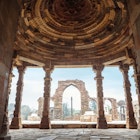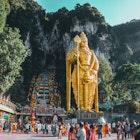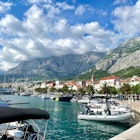More often than not, travel imprints itself on the mind, creating long-lasting, treasured memories of exotic landscapes, forged friendships and unfamiliar cultures. But as Tim Cahill explains, sometimes all you are left with is a feeling – one that moves you beyond comprehension and has the potential to change your life forever.
This is the final extract in our three-part series taken from An Innocent Abroad, a collection of true travel stories about innocence lost and life-changing experiences.

The desert was located in, well, OK, I don’t recall precisely where it was, but definitely somewhere in the United States. Certainly it was in a state west of Wisconsin, where I grew up and was, at the time, going to school, a junior in college and entirely innocent of America on the far side of the Mississippi. It was spring break and a couple of pals and I had decided, on the spur of the moment, that we should drive to California. It was going to be a long trip and we couldn’t sleep a lot because we wanted to be back when classes started and, more to the point, we didn’t have any money to waste on motels. Occasionally I caught an hour’s worth of shut-eye while someone else drove, but sleeping wasn’t easy with three hulking jocks in a VW Beetle.
So I was, I suspect, deep into one of those sleep-deprived modes in which unexpected emotions assault the senses. What I recall most clearly on that drive was this, uh…place. Instead of the green rolling hills with grazing dairy cows that I had seen all my life, there was a lot of, ummm…sand. And rock. I think. And it must have been early in the morning because the sun was low in the sky (but it could have been sunset) and I looked out over these, well, I think they were mountains. And we were on a lonely road or maybe we’d pulled over on an Interstate. We could have been deep in a valley or high on a ridge top. And spread out before us – or perhaps rising above us – was all this...landscape...that I’d never seen before. I stood there, battered by the raw power and sheer magnificence of a land I’d never known. My friends gave me a minute. Or perhaps they told me to take a minute. In any case, my eyes stung, as if I was about to cry. I don’t know why. I didn’t think about it.
The mountain or the deep valley or whatever it was shimmered in my vision and it might even have been that I could feel tears, real tears, on my face. But maybe not. In any case, I stood stock still and looked at this strange earth – whatever it was, wherever it was – and I said to myself: I will never forget this place.
I could see it whole in my mind’s eye for hours. Then I fell asleep and by the time we got to Los Angeles, it had vanished. I could not conjure it up again, not as I had seen it and felt it at the time. A place I’d never forget, gone in 24 hours.
A few years later, in 1967, I was living in San Francisco in what can only be described as a hippy crash pad. I was planning my first trip to Mexico and reading books on the culture and geography and food and music of that country. If you envision a mattress on the floor and a bunch of library books piled on all sides, you pretty much have the picture.
My crash-pad friends chided me in clouds of marijuana smoke. ‘Man, you’re doing it all wrong. Just go down there and let it happen, man.’ But I’d learned the lesson of ‘the place I’d never forget’ and was determined to know as much as I could about Mexico before I left. And then, when things happened, I’d never forget.
That didn’t work, either.
There are events I recall clearly but, unfortunately, they mostly involved problems with traveling companions and had little to do with Mexico itself. For instance, I know now that it is a bad idea to travel to Mexico with someone who is on probation for a dope bust in Texas. You may get to talk to local people a lot – but those people are police, and they are the ones asking the questions.
Some memorable events had to do with simple ignorance on my part. Back then, never having been a camper or backpacker, I had an inflated idea of the capabilities of an Army surplus sleeping bag. Sure, you can sleep outside in a pouring rain in such a bag, but soon enough you will be soaking wet and freezing, and in the morning the bag, drenched with water, will weigh 750 pounds and it will never dry out – but you might be able to give it to a local family who, in turn, will let you sleep in a shed with a couple of goats for a night or two.
These were tales my crash-pad friends found vaguely amusing, but I felt that my recollections were still misty and unsatisfying. At the time, I thought I wanted to be a writer. The Great American Novel would, presumably, spring into existence, whole and of a piece, directly from sights seen and emotions felt over the space of a lifetime, which at that time, was 24 years long. But here I was, trying to tell folks about a goat shed in Mexico, and I couldn’t fully answer simple questions about the story.
‘Oh, man, I bet that stunk in there.’
‘It wasn’t bad.’
‘Cool. What did it smell like?’
‘Well, you know, goats.’
‘Goats? Goats? Do I look like I know what freakin’ goats smell like?’
And it occurred to me that the stories I told would benefit from more detail. I couldn’t just experience something and expect to have it etched indelibly into my memory. I had to give names to the colors and odors and feel of things. I had to assess my own feelings, which gave emotion to the landscape. And I needed to do it on the spot, because travel often doesn’t allow you to backtrack. What color were the shadows on the cliff face? I felt confident with purple when it was right there in my notes. Nightfall, shadows purple down to absolute darkness. Ominous. Creeped out. Like that.
Northern California was all new to me and I spent what free time I had exploring. There were trips to Point Reyes or Mount Lassen or Big Sur. Every travel day, I’d make some time to sit quietly and take notes. And now, well over 40 years later, I can open those old spiral notebooks, read through the notes, and feel the day come back to me with remarkable clarity.
Another benefit of note-taking is that even the things I didn’t write about come vividly to mind. I can, for instance, recall the overlooked weather, feel the morning’s damp chill and see a bruised sky finally break open into a downpour that sent me scurrying back to a tent that rattled in the rain and that flapped and quivered in the wind.
Some people are certain they can recall such physical and emotional experience through their photographs. I can’t argue the point, though feeling through a lens is a rare talent and one that I don’t possess. I need to put words to sensations and emotions in order to own them forever. Whenever I can’t figure something out and take a photograph rather than a note, I know I’m losing the scene forever.
The lesson of the place I’ll never forget went deep. Why had I cried at my first sight of desert? It would be interesting to know. I should have taken a moment at the time to assess what I now call the ‘interior landscape.’ Taking notes, I have discovered over time, is an art into and of itself. When I have both observation and emotion on the page, I am sometimes able to feel an inkling of ‘what it all means’.
In time, I got a job writing about music for a little start-up magazine in San Francisco called Rolling Stone. Several years later, I was privileged to help conceive another new magazine called Outside. I did a lot of writing for Outside because I liked the work. A raft trip down the Owyhee River, a search for pre-Columbian ruins in Peru: I could scarcely believe people paid me to do this work.
And I was good at it. My obsession with notes served me well. Once home from a trip, all that scribbling turned itself into stories I could tell with a kind of sure-footed brio. Now, at 70, I’m still writing about travel, still enjoying it immensely and still amazed that I earn a living doing it. Sometimes I think my working life is charmed and that it all has to do with a mystical desert valley. Or mountain. ‘The place I’ll never forget.’ I’d like to say that it was a spiritual vortex of spectral beauty, but that’s just a guess. In my mind, it is a combination of hard felt emotion and harsh desert land that exists solely in my flawed recollection.
Then again, maybe it was in Utah.
Tim Cahill is a founding editor of Outside magazine. He is the author of nine books and co-author of three documentary IMAX films, two of which were nominated for Academy Awards. He lives in Montana.
A misunderstanding in Morocco. A Cuban con. An epiphany in the Czech Republic. These are just a few of the travel stories from some of the world's best-loved writers in our new book, An Innocent Abroad. Join our Google Hangout to discuss these tales of innocence lost with the book's editor, Don George.
http://shop.lonelyplanet.com/world/an-innocent-abroad-1/











